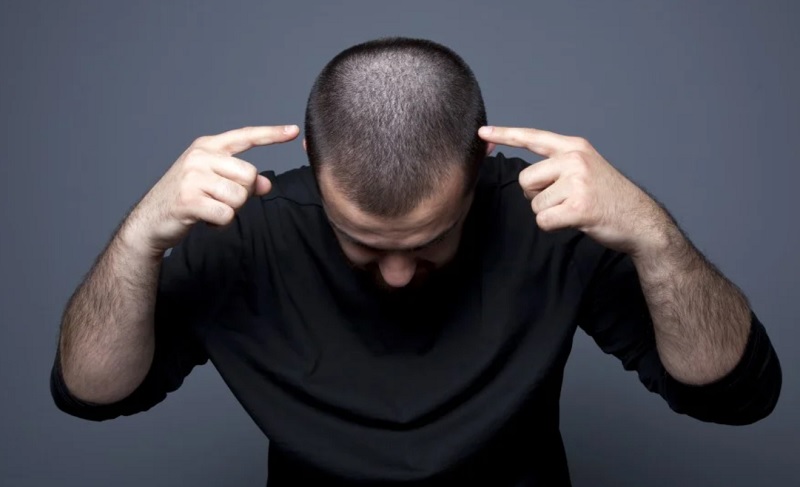
Modafinil’s appeal as a Smart Drug has lately skyrocketed. There is little doubt that this has increased the drug’s general use. You can now buy Modafinil online with ease owing to the multiple online pharmacies that stock the medicine.
The medication’s introduction and performance have unintentionally sparked various issues and questions concerning the prescription. Modafinil’s capacity to function as a nutritional supplement, or a chemical that boosts cognitive capacities, is a hotly debated issue. People ask about the drug’s side effects in web forums and organizations. Many people fear that Modafinil will harm the brain, whereas others fear any other prospective long-term adverse effects.
The question of whether modafinil triggers hair loss is commonly raised in numerous online discussions and communities. In this article, I’ll try to answer that question.

What are the effects of modafinil on the body?
Before we analyze whether modafinil can cause hair loss, let’s first define it and understand how it works.
Modafinil was designed to act as a eugeroic medicine. Eugeroics constitute CNS stimulants that aid in the body’s ability to stay awake. This shows that eugeroics such as modafinil may help to maintain wakefulness and alertness. Modafinil also has a number of adverse effects, including improved concentration and decision-making abilities.
Furthermore, research undertaken in the last 10 years has shown that modafinil may also be used as a nootropic. This suggests that modafinil can improve your cognitive capacities, or intellect, to be more precise. Long-term use of modafinil or provigil has been proven to boost people’s IQ. Furthermore, it has been observed that modafinil can increase a person’s memory.
The mechanisms through which modafinil may aid memory are currently being studied in depth. Modafinil, in general, lives up to its name of a smart drug.
Modafinil – Mechanism of Action
What sort of mechanism does modafinil have? Now that we have gained a better grasp of how it achieves its effects, let us talk about its mode of action.
Modafinil, as previously said, stimulates or activates the CNS in unique ways. Dopamine is the specific neurotransmitter that modafinil affects. Dopamine works as a neuromodulator which regulates sensations such as pleasure and satisfaction, as well as psychological and emotional focus, alertness, and cognition. Modafinil increases the effects of dopamine by keeping it within the system for a longer amount of time.
How does modafinil boost the effects of dopamine?
In terms of pharmacokinetics, modafinil is a minor DRI, meaning a dopamine reuptake inhibitor. As we all know, dopamine is a messenger chemical. There are small dopamine reuptake locations in the body that remove excess dopamine from the network once the right message has been conveyed. Modafinil blocks the removal or internalization of dopamine from the system by directly binding to these receptors, enabling it to accumulate. In this way, modafinil efficiently amplifies the influence of dopamine throughout the body.
What factors contribute to hair loss?
A sizable proportion of the worldwide population suffers from hair loss on a regular basis. Hair loss can be caused by a variety of factors. Before delving into the many reasons of hair loss, it is critical to distinguish between hair loss and hair fall.
Hair loss is just a natural aspect of life. Every day, we shed around 100 to 150 hair strands. Finding just a handful of hair on your hairbrush or pillow is not in any way worrying. It becomes a concern if hair loss leads to your hair’s natural fullness reducing.
Let’s have a look at the most common causes of hair loss, which have been documented across the world.
Common causes of hair loss
- Men are predisposed to pattern balding, which can begin as young as middle-aged and, in rare cases, as early as their twenties.
- Alopecia areata, which is an autoimmune disorder, causes rapid hair loss from all areas of the body because the body’s immune system attacks its own hair follicles.
- According to studies, a considerable section of the population suffers from genetic hair loss. Alopecia, or uneven hair loss, is now associated with genes.
- Hair loss is often an indication of an underlying sickness or problem, such as diabetes, obesity, or hyperthyroidism.
- Hair becomes brittle and easier to lose when certain minerals, vitamins, and amino acids are deficient. It is widely acknowledged that a lack of biotin is a key cause.
- Hair loss can be caused by bacterial or fungal infections in the scalp.
Tractional alopecia is a form of hair loss triggered by physical strain, such as pulling hair strands too tightly. Other hidden reasons for hair loss include unhealthful mental states and sudden psychological trauma.
Drugs that may cause hair loss
Medicines for high blood pressure, diabetes, and cardiovascular disease may cause temporary or permanent hair loss.
- Contraceptive drugs, hormonal replacement therapy, corticosteroids, and acne treatments can all disrupt the body’s hormone balance, resulting in hair loss.
- Significant hair loss is likely when treating mycotic infections.
- Hair loss is a well-documented side effect of anabolic steroids, radiotherapy, chemo, and birth control pills.
Why could some modafinil users experience hair loss?
Searches for “Modafinil hair loss” and “Modafinil alopecia” in respectable peer-reviewed journals and repositories, such as PubMed, appear to yield no published scientific works. Nonetheless, too many individuals have concerns about hair loss induced by modafinil usage.
This concern originates from real-life experiences shared by certain Modafinil users on online forums. Although their firsthand reports are most likely genuine, it has been repeatedly established that hair loss among modafinil users is typically caused by other causes rather than the medication itself.
Here are two examples that back up this claim.
- Modafinil is often used by professionals to stay awake, focused, and energized while working. This suggests that a sizable proportion of modafinil users lead hectic lives. It makes complete sense if such modafinil users have a high level of stress in their everyday lives. Modafinil somehow doesn’t immediately reduce stress, but it does help them stay ahead in their demanding lives. As a result, it is quite probable that several modafinil users have hair loss, yet the hair loss is due to stress instead of medicine.
- Patients who have multiple sclerosis are routinely prescribed modafinil. Hair loss is a typical side effect of persons suffering from sclerosis. However, suggesting that a person’s hair falls out as a consequence of modafinil would be illogical if they were taking it to treat their multiple sclerosis.
In conclusion, does Modafinil cause hair loss?
No. Notably, research has not proven that modafinil induces hair loss. It is doubtful that taking modafinil alone will induce hair loss. However, in this essay, we participated in a well-informed argument about modafinil as well as the reasons for hair loss in people. We discovered that the idea that modafinil causes hair loss is primarily based on the experiences of a handful of people and is not backed up by evidence. If you experience hair loss while taking modafinil, you should consult with a doctor who can rule out any underlying causes of your hair loss.
Author Profile
- I am the owner of the blog readree.com. My love for technology began at a young age, and I have been exploring every nook and cranny of it for the past eight years. In that time, I have learned an immense amount about the internet world, technology, Smartphones, Computers, Funny Tricks, and how to use the internet to solve common problems faced by people in their day-to-day lives. Through this blog, I aim to share all that I have learned with my readers so that they can benefit from it too. Connect with me : Sabinbaniya2002@gmail.com
Latest entries
 BlogJuly 12, 2025Top 10 AI Video Generator Tools to Watch in 2025
BlogJuly 12, 2025Top 10 AI Video Generator Tools to Watch in 2025 Artificial IntelligenceJuly 11, 2025Why AgentForce Is the Right Choice for Generative AI Development
Artificial IntelligenceJuly 11, 2025Why AgentForce Is the Right Choice for Generative AI Development Artificial IntelligenceJuly 10, 2025The Role of AI in Shaping Full-Stack Product Development in 2025
Artificial IntelligenceJuly 10, 2025The Role of AI in Shaping Full-Stack Product Development in 2025 How ToJuly 8, 2025How a Virtual Number in Switzerland Can Transform Your Communication Experience
How ToJuly 8, 2025How a Virtual Number in Switzerland Can Transform Your Communication Experience